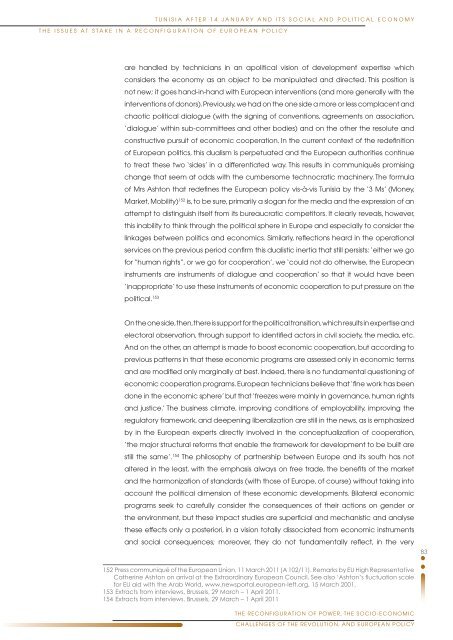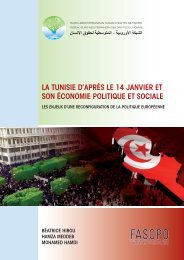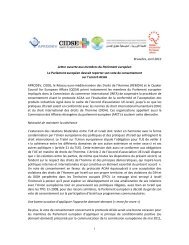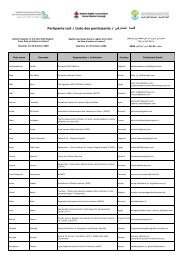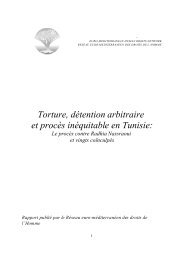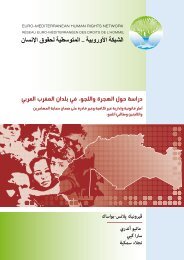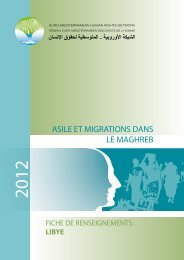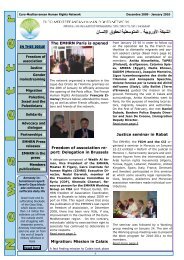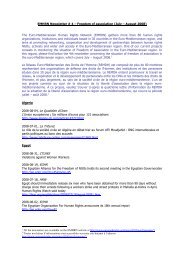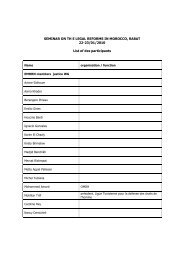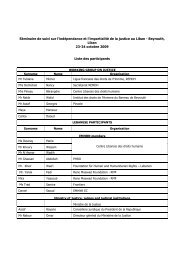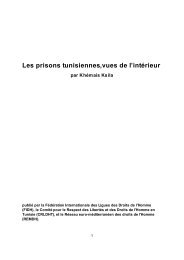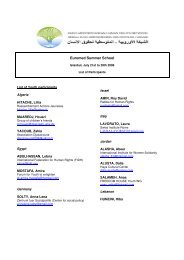tunisia after 14 january and its social and political economy - Refworld
tunisia after 14 january and its social and political economy - Refworld
tunisia after 14 january and its social and political economy - Refworld
You also want an ePaper? Increase the reach of your titles
YUMPU automatically turns print PDFs into web optimized ePapers that Google loves.
T U N I S I A A F T E R 1 4 J A N U A R Y A N D I T S S O C I A L A N D P O L I T I C A L E C O N O M YT H E I S S U E S A T S T A K E I N A R E C O N F I G U R A T I O N O F E U R O P E A N P O L I C Yare h<strong>and</strong>led by technicians in an a<strong>political</strong> vision of development expertise whichconsiders the <strong>economy</strong> as an object to be manipulated <strong>and</strong> directed. This position isnot new; it goes h<strong>and</strong>-in-h<strong>and</strong> with European interventions (<strong>and</strong> more generally with theinterventions of donors). Previously, we had on the one side a more or less complacent <strong>and</strong>chaotic <strong>political</strong> dialogue (with the signing of conventions, agreements on association,‘dialogue’ within sub-committees <strong>and</strong> other bodies) <strong>and</strong> on the other the resolute <strong>and</strong>constructive pursuit of economic cooperation. In the current context of the redefinitionof European politics, this dualism is perpetuated <strong>and</strong> the European authorities continueto treat these two ‘sides’ in a differentiated way. This results in communiqués promisingchange that seem at odds with the cumbersome technocratic machinery. The formulaof Mrs Ashton that redefines the European policy vis-à-vis Tunisia by the ‘3 Ms’ (Money,Market, Mobility) 152 is, to be sure, primarily a slogan for the media <strong>and</strong> the expression of anattempt to distinguish <strong>its</strong>elf from <strong>its</strong> bureaucratic competitors. It clearly reveals, however,this inability to think through the <strong>political</strong> sphere in Europe <strong>and</strong> especially to consider thelinkages between politics <strong>and</strong> economics. Similarly, reflections heard in the operationalservices on the previous period confirm this dualistic inertia that still persists: ‘either we gofor “human rights”, or we go for cooperation’, we ‘could not do otherwise, the Europeaninstruments are instruments of dialogue <strong>and</strong> cooperation’ so that it would have been‘inappropriate’ to use these instruments of economic cooperation to put pressure on the<strong>political</strong>. 153On the one side, then, there is support for the <strong>political</strong> transition, which results in expertise <strong>and</strong>electoral observation, through support to identified actors in civil society, the media, etc.And on the other, an attempt is made to boost economic cooperation, but according toprevious patterns in that these economic programs are assessed only in economic terms<strong>and</strong> are modified only marginally at best. Indeed, there is no fundamental questioning ofeconomic cooperation programs. European technicians believe that ‘fine work has beendone in the economic sphere’ but that ‘freezes were mainly in governance, human rights<strong>and</strong> justice.’ The business climate, improving conditions of employability, improving theregulatory framework, <strong>and</strong> deepening liberalization are still in the news, as is emphasizedby in the European experts directly involved in the conceptualization of cooperation,‘the major structural reforms that enable the framework for development to be built arestill the same’. 154 The philosophy of partnership between Europe <strong>and</strong> <strong>its</strong> south has notaltered in the least, with the emphasis always on free trade, the benef<strong>its</strong> of the market<strong>and</strong> the harmonization of st<strong>and</strong>ards (with those of Europe, of course) without taking intoaccount the <strong>political</strong> dimension of these economic developments. Bilateral economicprograms seek to carefully consider the consequences of their actions on gender orthe environment, but these impact studies are superficial <strong>and</strong> mechanistic <strong>and</strong> analysethese effects only a posteriori, in a vision totally dissociated from economic instruments<strong>and</strong> <strong>social</strong> consequences; moreover, they do not fundamentally reflect, in the very83152 Press communiqué of the European Union, 11 March 2011 (A 102/11). Remarks by EU High RepresentativeCatherine Ashton on arrival at the Extraordinary European Council. See also ‘Ashton’s fluctuation scalefor EU aid with the Arab World, www.newsportal.european-left.org, 15 March 2001.153 Extracts from interviews, Brussels, 29 March – 1 April 2011.154 Extracts from interviews, Brussels, 29 March – 1 April 2011The reconfiguration of power, the socio-economicchallenges of the revolution, <strong>and</strong> European policy


